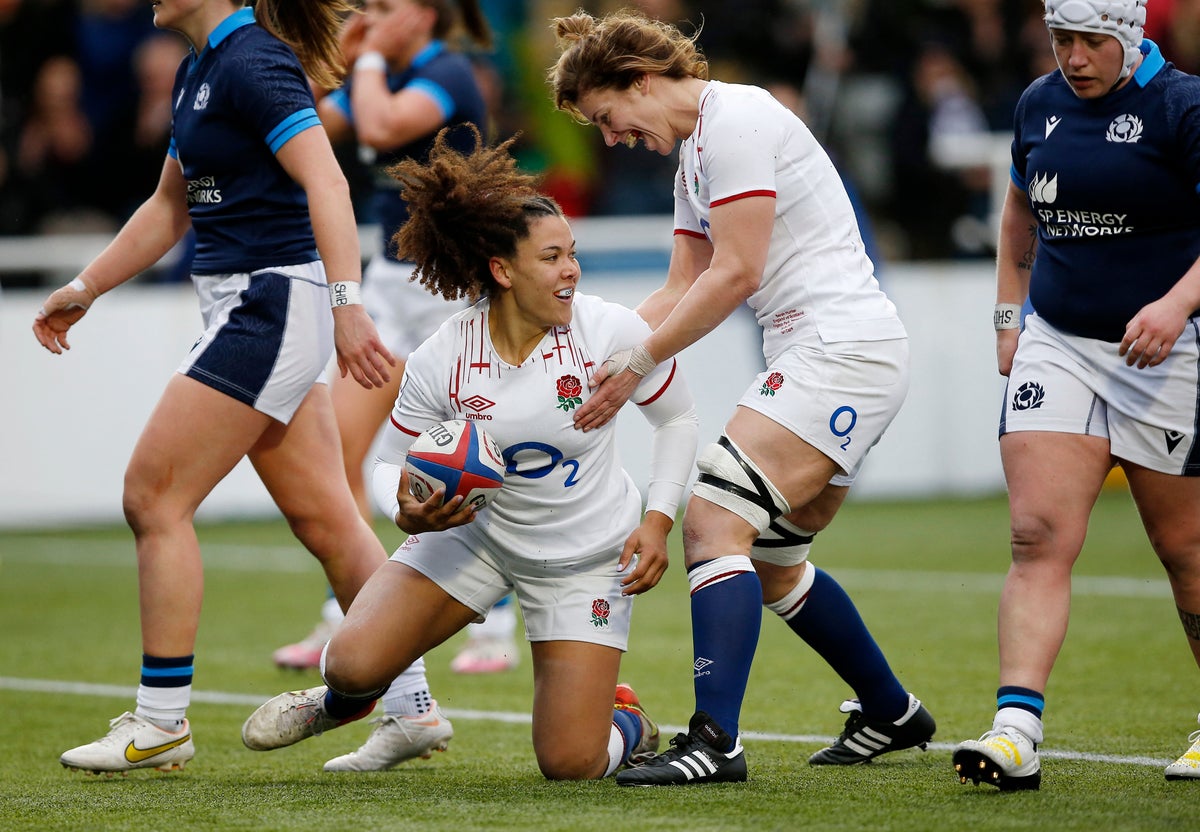
Tatyana Heard perches on a white chair at England’s training base, feeling the exertions of a long, hard day and reflecting on four long, hard years. There are many tales of resilience in women’s rugby but the centre has had to battle more than most. Against Italy on Sunday, the 28-year-old will make her third Women’s Six Nations start some 50 months on from her last, an intervening period that has tested the resolve of a gifted player.
In 2019, the centre was one of the first 28 England players awarded a full-time contract, a rising star of the English game backed by Simon Middleton to become a key midfield fulcrum. But an untimely dip in form left Heard on the fringes, before a ruptured ACL – not the first of a young career - ended her hopes of a renewal of the eight-month contract entirely. In the current landscape, where those outside of the international set-up cannot make a living playing rugby, missing out was all the more difficult.
“It was massively tough,” Heard tells The Independent. “I went from having my dream job, playing rugby for England, to not having a job at all. I was like: ‘Wow, I don’t know where this leaves me. I don’t know what to do.’
“It was a massive shock when I got that contract originally. I was massively grateful. I never thought I would be able to say I was a full-time rugby player. But the whole time, because it was really new to me, and I wasn’t a consistent starter, there were a lot of people above me. You’ve got to go through those moments where you know you are not at the top of your game. People have to be realistic with that. I knew I had a lot of learning to do at that point.
“I didn’t take it for granted, but when I had the contract I spent a lot of time feeling anxious and nervous that I wasn’t going to get it again. So when I got injured, I thought, ‘well, that’s me done now’. At the time, I probably needed to live in the moment and appreciate it for what it was.”
Heard’s return from the injury coincided with the start of the Covid pandemic. By the time she was back to her best on the pitch, she had begun to wonder if she had missed her opportunity as the Red Roses built their record winning run in her absence.
“It was always a question - ‘am I ever going to get back in?’ They had people that were settled in that environment and I thought I’d missed my opportunity to come back in again.”
But Heard was always in Middleton’s thoughts. Having been forced to miss last year’s Six Nations with a hamstring injury, the Gloucester-Hartpury centre impressed during preparations for the World Cup last summer. She did not expect to make the eventual travelling party but, once included, emerged as the breakout star of the Red Roses’ run to the final, starting three games in New Zealand. Despite the cruel end in Auckland, the overall experience boosted Heard’s confidence and she is starting to feel more at home in an England shirt.
“When [Middleton] called to offer me a contract, I couldn’t believe it,” she admits. “It came as a shock because I had no expectation to be back in and around the squad so consistently. Even if I didn’t go to the World Cup, my attitude was I was living the dream and having a great time.
“That’s the ethos I have now. Having gratitude that I am here and I am living my dream, however long that lasts. I feel I am starting to grow into being here and owning my place when I get the opportunity.”
Born in Pisa to a father in the US Army, Heard would have qualified for both Italy and the USA had she wished to pursue an opportunity, but is deeply proud of her family’s roots in Yorkshire, where she grew up - an England return was always the goal. A different character to most in Red Roses camp, Heard is a voracious reader, always looking to expand her horizons, which she believes has benefitted her on the pitch.
This is a more diverse England squad than some in recent years, which Heard feels is important. “Especially with women, they tend to gravitate towards people like them, somewhere they fit in and feel comfortable and empowered,” she explains. “I feel like in an environment like this, there needs to be lots of different people because everybody needs to feel welcome. You are not going to be as comfortable if you don’t have people you can relate to.
“I never really struggled with it, but I grew up in an environment where my brother and I were the only mixed-race people in our school. Where I am from, there were farmers, sporty kids, and sporty farmers!
“I never felt like I was different because that had always been the case. I got used to it and just thought it was the norm. [But] for sport in general, it is massive to have diverse backgrounds so people feel empowered in that environment no matter what they look like, no matter what they sound like.”
The future for England’s players beyond this tournament is more uncertain than usual, with a coaching change imminent as the build-up to a home World Cup in 2025 ramps up. But Heard’s mind is not overly occupied by what lies ahead. After the injuries and interruptions, she’s back doing what she loves in an England shirt - and only just getting started.







